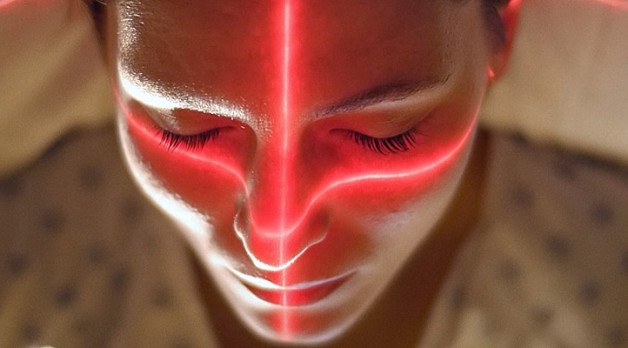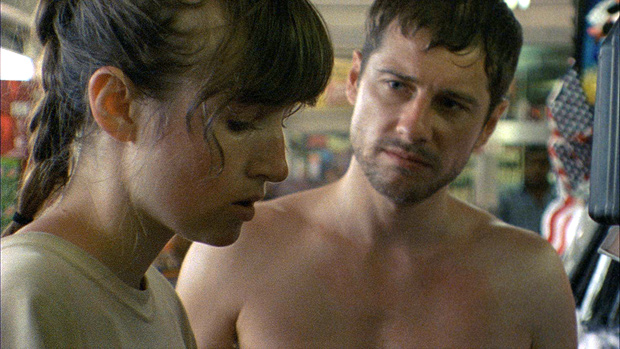By providing your information, you agree to our Terms of Use and our Privacy Policy. We use vendors that may also process your information to help provide our services. This site is protected by reCAPTCHA Enterprise and the Google Privacy Policy and Terms of Service apply.
Amy Seimetz Discusses Her Busy Year and Why She Hates Being Labeled a ‘Breakout’
Nigel M. Smith

Amy Seimetz is having a moment. The writer-actress-filmmaker has for the better part of a decade been making a name for herself on the indie film circuit by working with everyone from Lena Dunham on “Tiny Furniture” to Joe Swanberg” in “Alexander the Last” to anchoring Megan Griffith’s acclaimed Sundance character study “The Off Hours.”
This year, however, marks Seimetz biggest one yet. First came Shane Carruth’s “Upstream Color,” in which she co-starred with the writer-director in one of the most perplexing indies to come along in ages. Friday sees the theatrical release of her directorial debut “Sun Don’t Shine,” a 16mm shot, micro-budget portrait of a couple (Kentucker Audley and Kate Lyn Sheil) on the run for murder. In August you can catch her in Adam Wingard’s acclaimed horror pic “You’re Next,” opposite Ti West and Swanberg. And on the small screen, she can soon be seen in Christopher Guest’s anticipated HBO comedy series “Family Tree,” in addition to the surprise third season of AMC’s “The Killing.”
On a brief break from shooting “The Killing” up in Vancouver, Seimetz called up Indiewire to discuss her crazy year, the inspiration behind “Sun Don’t Shine” and why she takes issue with being labeled a breakout.
You’re by no means green to the business, but this year by all accounts seems like a breakout one for you. What do you make of that label?
I don’t like it. You want people to pay attention ’cause otherwise you wouldn’t have chosen such a public medium. But no, I don’t like the breakout term because I think it’s been said of me for how long? And it also sounds like I’m breaking out of some sort of prison that I’ve put myself in. Some self-imposed prison like ‘oh finally, she’s gonna make the movie that she always wanted to make,’ when really I’ve been doing the stuff that I’ve been wanting to make and building and loving the collaboration and loving each and every assembled piece of whatever I’ve been doing. It’s never been about getting to a famous point.
I guess I never really considered that part in a way, which is something to think about now. I never really thought about that, I just really liked making movies with people and collaborating and storytelling with people.
How are you handling that ‘part’ so far?
I haven’t really felt it yet and that’s why it might seem that my answer is really in limbo. I haven’t felt it yet and I don’t necessarily think that I’m recognizable in the show [“The Killing”]. It will be interesting to see how that will be pervasive in my life as sort of a hermit. I guess it won’t be because I’ll still be doing the same things.
It’s interesting because my heart will always be with making movies that are handcrafted films. These films that are auteur driven or are collaborative where you have a script or you don’t have a script and you can change the idea at every whim. I guess you have to keep in mind that I’m not on a network television show, it’s AMC and HBO, and for the most part Christopher Guest is allowed to do whatever he wants. He could do whatever he wanted and I could say whatever I wanted. It was very exciting in a lot of ways to be working with Christopher Guest but I guess I’m delusional in a sense that even with the smaller things, I just always never think that anyone’s going to watch them. I don’t know how to explain that but there is maybe a delusional part of your brain that you go into when you perform to get yourself in a state, where you don’t think anyone’s ever going to see it and you get excited. If you get excited about the idea that people might see it, then you start to get really scared and you start to wonder where your intentions are. I think that’s sort of the process of I don’t know… a constant cycle I guess.
 The two TV projects couldn’t be any more different. What genre do you feel more comfortable in, comedy or gritty drama?
The two TV projects couldn’t be any more different. What genre do you feel more comfortable in, comedy or gritty drama?
I don’t think that there’s necessarily a side to drama that has to be completely bleak. You have to have a flicker of humor ’cause everyone has a flicker of humor, something they find funny in life. I think in order to do that you have to have a sort of sense of humor about life.
I guess I trust in the director of the tone that we’re going to hit. I like to invest as a performer in the director’s vision and then bring a sense of reality to whatever I’m doing, whether it’s comedy or whether it’s drama, and trust that they’re going to tell me if something’s reading as funny or if it’s reading as dramatic or reading in the right tone. For me it feels natural to be in both worlds.
With that said, “Sun Don’t Shine” is pretty dark at heart. What inspired it?
I feel like “Sun Don’t Shine” on a second view becomes a lot funnier. When you realize they’re doomed you can kind of laugh about certain situations and sort of the human nature in certain situations. There were some takes where all of us would just laugh because it was so honest and so true. These are people that are going insane. So that was really important to me to find this level of insanity that they were going through that was so dark but also completely comical if you were like extracted from the situation and sort of see how they’re behaving.
It was born out of… I was going through a really difficult time, dealing with a lot of death and there’s just no sane way to deal with it. There’s not a right or wrong or rational way to deal with death really, it’s just sort of how you react to it. And sometimes it can be very funny in retrospect, sometimes it can be really dark and heavy.
 The plot line itself was a nightmare that I had for a long time, a very very long time which seemed like a really good visceral place to start a movie. I’m more concerned with the stuff I direct with the visceral and with the stuff that you can’t explain. I liked the caveat of having a narrative in there to keep people going, a through line with an end point if that makes sense.
The plot line itself was a nightmare that I had for a long time, a very very long time which seemed like a really good visceral place to start a movie. I’m more concerned with the stuff I direct with the visceral and with the stuff that you can’t explain. I liked the caveat of having a narrative in there to keep people going, a through line with an end point if that makes sense.
As an actress who’s worked with so many filmmakers indebted to the digital revolution, I’m curious… why did you shoot your debut on film?
There’s a lot of reasons going in. I did learn on film when I was younger, so there’s that aspect of it, and I also like the idea of the sort of permanence and classic look of film that it wasn’t going to age.
Also, Jay [Keitel, the cinematographer] and I also talked about re-creating this form of some of the 1970 films that we really liked — the classic Americana. Even in cinema now there seems to be this new sort of maverick movement of taking the power away from the studio and making your own stuff. And it seemed like we wanted to evoke that feeling.
But not only that, we just started to break it down and it just made sense. And if you can get some deals, which we did through Kodak, there’s different forms so you can save money here and there.
But aesthetics were the main reason — I couldn’t see it outside of film. I like the grain how it breathes. I knew that I didn’t necessarily want it to be this plot driven movie. I wanted the medium to move and breathe and be sort of agitated in the same way that heat is agitated, the way that sound design is agitated, and the same way that characters are really internal and are agitated because each frame is constantly moving with grain. You can always apply it obviously in post with digital, but its just not the same. It’s not as spontaneous or as alive or unpredictable in the way that “Sun Don’t Shine” is.
By providing your information, you agree to our Terms of Use and our Privacy Policy. We use vendors that may also process your information to help provide our services. This site is protected by reCAPTCHA Enterprise and the Google Privacy Policy and Terms of Service apply.
















